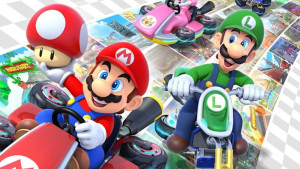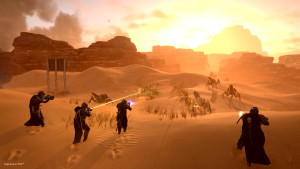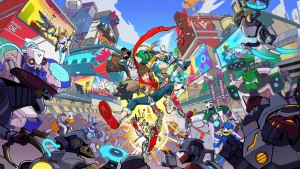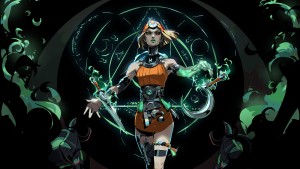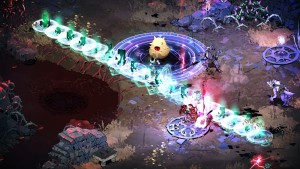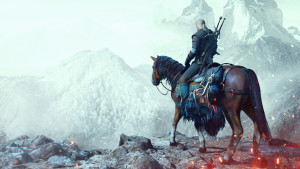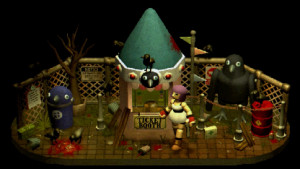Please support Game Informer. Print magazine subscriptions are less than $2 per issue
Revealing The Surprising Depth Of Suda51
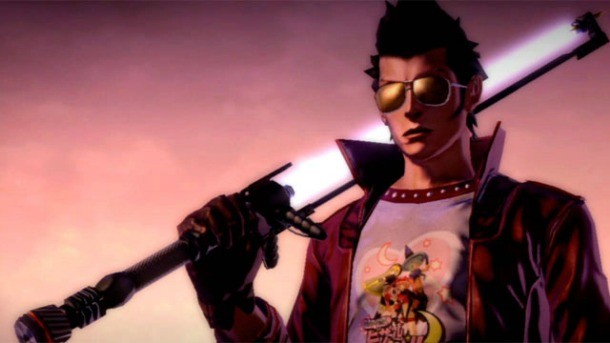
Suda Goichi (also known as Suda51) has a strange approach to game design. He famously thought of the concept for No More Heroes while using the bathroom, but his creation process is a little more nuanced. His writing style derives from his subconscious, which allows players to infer their own meanings from the vagueness of his insanely weird works. While the satire of Suda's games is filled with immaturity and toilet humor, these games manage to tackle mature subjects that are difficult to discuss in any entertainment medium. The following are just some of the themes we've found in Suda's creations. Be warned there are spoilers ahead.
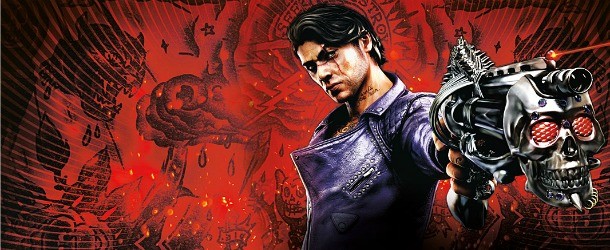
Love Hurts – Shadows Of The Damned
What it's about: On the surface,
Shadows of the Damned is a straight-forward, save-the-princess story with some
immature jokes and general weirdness thrown in for good measure. The game stars
Garcia F. Hotspur, a demon hunter who met his amnesiac girlfriend Paula in a
dumpster. Besides her sudden violent outbursts they're happy until Fleming, the
lord of the underworld, kidnaps Paula as revenge for Garcia meddling in his
affairs.
Our Interpretation: This wouldn't be a Suda game without something crazy thrown into the mix, and for Shadows of the Damned, it's that Paula is the true final boss instead of Fleming. This puts the game in a different perspective, one where Fleming and his horde of demons could be considered part of Paula's psyche. Each boss encounter sees Paula ripped to shreds in front of Garcia, which could be symbolism for his image of her being ripped away as they argue. After the big fight with Paula at the end of the game, it begins to feel more like a break-up as the two lovers are swallowed in darkness, the player helpless to stop their health bar from depleting. This emulates that sinking feeling in your stomach from knowing a relationship is over with no way to stop it. After that, we find a bittersweet scene of Garcia and Paula planning a vacation before getting attacked by demons once again. Without a cliché happy ending, Shadows of the Damned shows that relationships are a constant struggle that require work and dedication to keep them thriving.
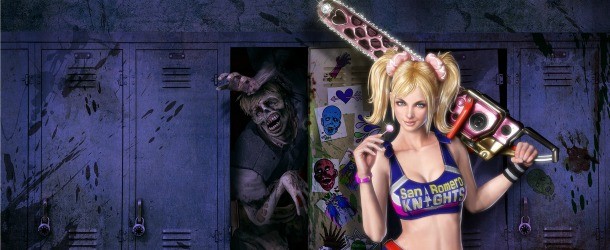
Can Women Do it? YES THEY CAN – Lollipop Chainsaw
What it's about: Lollipop Chainsaw
seemed problematic from its first trailer, which depicted a sexy cheerleader
protagonist and a grindhouse aesthetic. That idea gets flipped on its head
almost immediately when the main character Juliet Starling saves her boyfriend
Nick from turning into a zombie by chopping his head off. For the rest of the
game Nick becomes a sexually objectified fashion accessory as Juliet kills the
undead with relaxed precision. The main antagonist Swan causes the zombie
apocalypse because he's a spurned lover who won't move on, nearly destroying
the world in the process. It's no surprise this game has a strong female lead considering
Guardians of the Galaxy writer/director James Gunn co-wrote the story.
Our Interpretation: Sexual objectification of the female form has been as constant in games as pressing A to jump. Few games acknowledge this is an issue, with more and more filling up with bikini armor and DLC school girl outfits. While Juliet Starling also jumps around in a sexualized outfit, Lollipop Chainsaw manages to critique a number of tropes despite this. From its first level onward, women are depicted as competent zombie hunters while the men run around like chickens with their heads cut off. Juliet's dad and Nick are constantly objectified even when the former no longer has a body. Meanwhile Juliet's sisters frequently talk about the benefits of a bodiless boyfriend.
Lollipop Chainsaw doesn't stop at making fun of how games depict women. The main antagonist's entire motive for causing the zombie apocalypse is because Juliet picked Nick over him. Out of entitlement, he nearly destroys the world, starting by infecting five people, turning them into Dark Purveyors who act as the biggest enemies of the game. Each boss can be seen to represent a different aspect of Swan's emotions after being spurned by Juliet. The first boss Zed is the most obvious as he uses demeaning words like "b**ch" and "s**t" as weapons - turning each word into giant wall of pain. Other bosses then show the range of emotions and strategies a forlorn lover might try to use to get the object of their affection, from playing the "nice guy" to pretending to be smooth talking tough guys.
Juliet ultimately defeats these ridiculous bad guys, ending in a fight against rotting Elvis Presley impersonator that's the size of several buildings. She's never kidnapped during the course of the game and uses a ridiculous magical chainsaw to boot. While the cheerleader motif is a bit dicey, Lollipop Chainsaw shows that you can have a female protagonist that's both attractive and powerful.
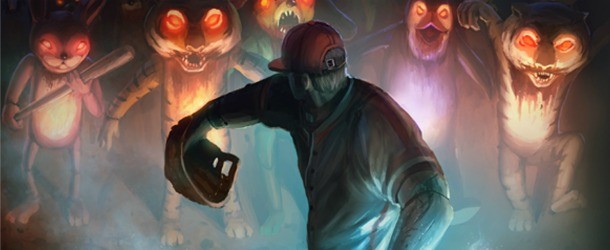
I'm Not Throwing Away My Shot – Diabolical Pitch
What it's about: Diabolical Pitch starts off with a guy at rock bottom. McAllister is a
disgraced baseball pitcher who not only lost the last game in his career but
also crippled his throwing arm, ruining any chance of making a return. Just as
he's about to drive into the front of an oncoming semi-truck, the leader of an
evil circus saves him from complete destruction and offers a chance at
redemption: take a bionic arm and plow through hordes of demons to fulfill his
wish or die gruesomely. If McAllister
completes this trial, he'll be granted a wish for anything he can think of.
Our Interpretation: Recovering from an accident can be an extremely difficult road; for many people it is the most painful experience of their lifetime. McAllister's story parallels a person's road to recovery. At the beginning of the game, he is about to throw away everything when he's given one last ditch chance to get his old life back. He risks life and limb while going through an insane rendition of hell to get what he had. McAllister confronts the same feelings that people have during trauma recovery, including hopelessness and a loss of self-worth. It's hard to create a compelling game about the recovery process, but by having it take place in a hellish landscape, Suda has used this allegory as a way to encourage people to seek redemption. As McAllister makes his way through the challenge, people try to convince him to use his wish for vast wealth or an easy life. Instead he gruffly responds with how he "just wants his arm back," striving forward while slowly getting stronger. The player gets power-ups like a standard video game, but for a man who started the game with a handicap it takes on a whole new meaning.
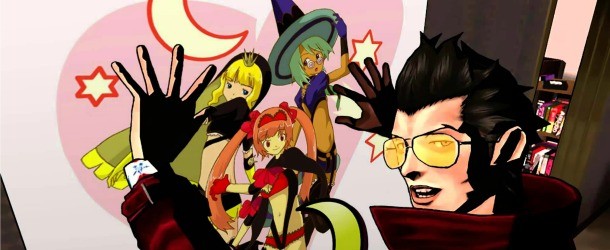
The Game Industry Needs To Get Better – No More Heroes
What it's about: No More Heroes features one of the most loathsome protagonists to ever star in
a video game. Travis Touchdown is a disgusting pervert modeled after Johnny
Knoxville who spends all his money on anime figures and wrestling paraphernalia.
After winning a beam katana in an auction, he is contacted by Sylvia Christel
of the United Assassin's Association to take on a job. From there he must rise through
the ranks, killing every assassin until he's at the top of the syndicate.
Our Interpretation: The first No More Heroes had a defined loop for gameplay: Travis does odd jobs to build up his savings, pay Sylvia an entry fee, and then defeat the next ranked assassin. The odd jobs take the longest amount of time, mirroring the lengthy work weeks some gamers go through in real life to afford games they beat in a few hours. It's no surprise that Travis doesn't have time to do anything beyond fighting. Sylvia gives him consistently more grandiose battles, making her a stand-in for a game developer. The last two bosses are revealed to be Travis' siblings, echoing the olden days when your biggest rival was a relative that could mash buttons better than you.
While Travis is content as he pays more and more for each boss, in No More Heroes 2: Desperate Struggle something changes. He begins to have an apathy towards staying on top, wondering if there's a point to his struggle. Even the final boss Jasper feels like a game with a weary sequel, the vengeful son of someone Travis murdered in the first game. As the assassins are killed and Travis rises through the ranks, he promises to destroy the UAA, ending the process once and for all. As Travis gets weary of the fighting, he embodies the same emotions many gamers who quit their hobby have experienced. Despite this, at the end it seems Travis can't let it go, reuniting with Sylvia some time later for a reason that wasn't revealed. In this moment we see Travis have hope for the first time in the entire game. He's willing to work with Sylvia to fix a world he spent most of the game lamenting. If Sylvia is the game developer and Travis is the player than this is Suda's plea for gamers and developers to come together to create a better industry. This is given even more credence by the fact this game was being developed after games first become $60, enraging many gamers looking to afford the hooby.
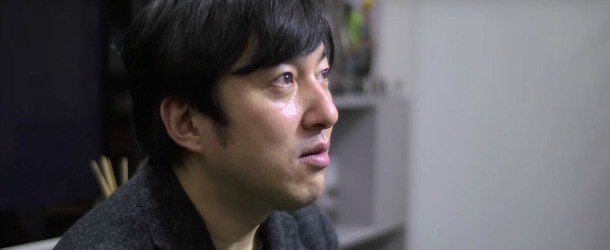
The Crazy Train Keeps On Chugging
Video games are one of the most unique entertainment mediums, yet many still deliver
stories that are little more complex than "kill the thing, get a
reward." While Suda still relies on many of the tropes he critiques, his
games are known to be amazingly memorable experiences. Video games are one of
the most unique forms of entertainment, so it's great to see a developer use
them to explore some difficult themes.

